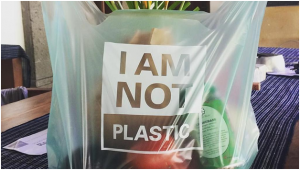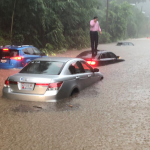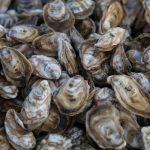Plastic Bags Should Be Banned…Or Not?
By Arjun Shah, Walt Whitman High School
Plastic is one of the modern human’s best and worst inventions. While it provided for mass scale industrialization and an easy, malleable material that could be used in the creation of millions of objects; it also contrasted that effect and caused an acceleration in the deterioration of the Earth. It is common knowledge to most living in the 21st century that plastic does not deteriorate quickly. Thus, when humans dump plastic, it does not biodegrade and stays for hundreds of years in landfills. Another alternative was dumping the plastic into bodies of water: this being detrimental to aquatic life. For many years now, sea creatures have attempted to ingest the plastic thinking of it as food. Hundreds of thousands of marine animals have lost their lives to plastic and there is no coming back from that. Over time, the masses of plastic in the ocean became so large that they started forming makeshift bodies of land.
One of the places fallen victim to such cruel human action is the island nation of Indonesia. The island nations in South-East Asia became hubs for such vile pollution. Malaysia, Indonesia, the Philippines all went through mass-industrialization in the past few decades, hence the exponential increase in plastic usage. Perhaps sick of living in such conditions, some Indonesians were not happy with the contamination and decided to brainstorm ways to make plastic more sustainable for the victims in Indonesia and the environment itself. Enter Avani, compostable and drinkable plastic bag. It sounds absurd, that one could eat plastic, especially because so many lives have been lost due to digestion of the toxic chemicals combined with the asphyxiation from the material itself. But it is true. Avani has managed to create a revolutionary idea. What they have been doing is replacing coffee cups, food boxes and cutlery -made of cheap and harmful plastic- with their own engineered “plastic” bags. At first glance, it looks exactly the same as a typical plastic bag but, something is different: it doesn’t have a single residue of petroleum. It’s made from the Cassava root, known in the western hemisphere as yucca and native to the Americas.
 The Avani bag could allow for complete economic and environmental sustainability. Image: AvaniEco
The Avani bag could allow for complete economic and environmental sustainability. Image: AvaniEco
Yucca is great; for a long time the natives of America thrived on it. Its discovery has been relatively new to the whole world but due to mass scale trade between nations in the eastern hemisphere, yucca reached far more people than before. Consequently, nations such as Indonesia received it and, fast-forward to now, it is being used to make edible “plastic” bags. The bag can be placed in water and dissolves; however, due to the fact that it’s made of organic yucca material, one can digest it as well-safely. It has no poisonous side-effects to humans, animals or plants. If this were to be dumped into the ocean, it would simply just dissolve.
How amazing is that? Why don’t we just mass-produce this and start the process? Unfortunately, Avani operates on a domestic scale. While I commended their progress and their effort into tackling such a pressing issue, I wanted to see if there were people with similar ideas in the United States who were trying to make a change. Algotek, a company based in Ohio produced an algae-based equivalent to the Avani yucca bags. Testing is still on-going but if this idea was to work, it could get rid of the single most underlying problem of eco-friendly plastics: price. Yucca is an expensive plant, much more than petroleum. The organic plant does not stand a chance with the vast amounts and It’s really hard to make something more widespread if the price is not cheaper; there would be no incentive to switch. Many attempts in the United States had been made trying to convert corn to the same plastic material as algae or yucca. Trials showed that it did work, but it was far too expensive to produce. Algae, on the other hand, were much cheaper because it did not have a market price. No market price means far cheaper prices to produce the plastic. If algae plastics go commercial, it could be step one in the revitalization of the Earth. Ultimately, plastic bags should not be banned… they should be replaced.
Works Cited
Gray, Alex. “This Plastic Bag Is 100% Biodegradable.” World Economic Forum, 2018, www.weforum.org/agenda/2018/05/this-plastic-bag-is-100-biodegradable-and-made-of-plants/.
Whiting, Kate. “Indonesia Has a Plan to Deal with Its Plastic Waste Problem.” World Economic Forum, 13 Mar. 2019, www.weforum.org/agenda/2019/03/indonesia-has-a-plan-to-deal-with-its-plastic-waste-problem/.
Wills, Lauren. “The Edible, Biodegradable Carrier Bag That’s Safe for Fish to Eat!: News.” LIVEKINDLY, 13 June 2018, www.livekindly.co/edible-biodegradable-bag/





